Animal Welfare Updates: November - December 2022From the Executive Director's Desk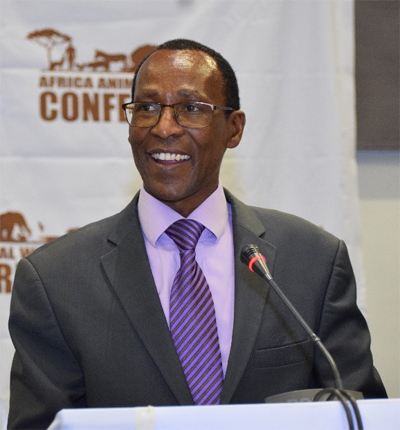
Dear Friends and Partners, In a few days, we will all be bidding farewell to this year. It is always astounding how fast a year goes by. It seems like just the other day when I was wishing all of us a prosperous New Year, 2022! Animals continue to face increasing threats to their survival, and support such as you have given to ANAW, especially this year, has gone a long way in giving our animals a chance for survival even in the face of these monumental challenges; and for that, we are forever grateful. As we come to the end of the year, I am particularly glad to report to you that as an organization, working with our incredible partners, we have been able to achieve many important animal welfare milestones, some of which you will read in this newsletter, while the rest will appear in our Annual Report to be out in the first Quarter of next year, 2023. This year’s continental animal welfare forum – The Africa Animal Welfare Conference (AAWC) – Action 2022 themed, ‘Animals, People, and the Environment in a Rapidly Changing 21st Century’ was hosted by the government of Botswana, United Nations Environment Program (UNEP), The African Union - InterAfrican Bureau for Animal Resources (AU-IBAR) and Africa Network for Animal Welfare (ANAW). The gathering brought together 130 delegates physically and 240 virtually, including government leaders, diplomatic officials and civil society organizations from different countries across the world. After the end of the conference some recommendations were drafted as the outcome of the conference which will become resolutions upon adoption by key stakeholders. Allow me, on behalf of the Chairman, Board and staff of ANAW and ANAW-USA, to sincerely thank you for your support in 2022. You have made a great contribution to Africa’s animals and with your continued support, we are without a doubt looking forward to 2023 with renewed energy for the work we do. May you have a blessed Christmas and prosperous New Year 2023. Sincerely, A Narrow Escape for A Stray Zebra Who Sought Refuge in a Classroom in Machakos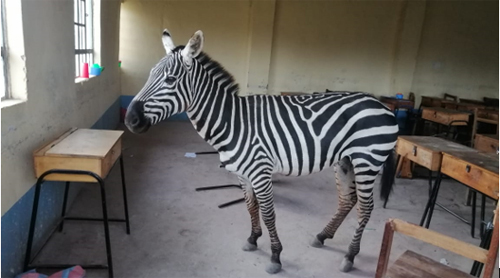
The Male Zebra Takes Refuge in a Classroom An unusual case of a stray zebra rescue took place after the animal sought refuge in a classroom at Miumbuni AIC Secondary School narrowly escaping the clutches of human beings in an adverse occurrence of human-wildlife conflict in Machakos County on a November evening. In a joint statement, ASAL (Arid and Semi-Arid Lands) Humanitarian Network announced that Kenya had been experiencing the most severe and longest drought (2020 to 2022) of three severe drought period in the last decade (2010-2011, 2016-2017 and 2020-2022) in October 2022. The drought in Kenya had driven hundreds of wildlife to seek reprieve from the ravages of the impact of climate change in the region by seeking for water and food in community areas. In the area, a lot of animals had been straying out of ranches to community farms in search of pasture. The zebra had lost its way not aware that it risked becoming food itself as had other victims. It is believed that the zebra had left Manzoni Ranch and found its way out approximately 10 kilometers away from the ranch to community farms in an area called Komarock. The zebra luckily escaped villagers’ pursuit and found haven in a school where it went to hide in a classroom. In an exemplary act of strong leadership, the school principal went against the norm of the community and strove to protect the zebra. He locked the classroom door and called the Kenya Wildlife Service (KWS). ANAW in partnership with KWS veterinary unit from Nairobi headquarters and the Machakos KWS station helped to rescue the male zebra preventing it from being butchered by community members. When the rescue team arrived in the area, the animal was still inside the classroom. The veterinarian darted the animal and let it out of the classroom. It was loaded in ANAW’s vehicle and translocated to the game ranch sanctuary which was approximately 50 kms away. Many other animals had not been so lucky. In the last few months, over ten (10) animals among them six (6) giraffes and five (5) wildebeests had been butchered and eaten by villagers in this area after straying in their farms. Good News as Primates are Rescued and Treated in Diani, Kwale CountyAs one takes a stroll along the Diani Beach, he or she is likely to encounter land and aquatic creatures on the shores of the Indian Ocean, in water and on land. As much as the animals enjoy the feeling of joy that ocean brings with it, there are moments that they get hurt and need care. 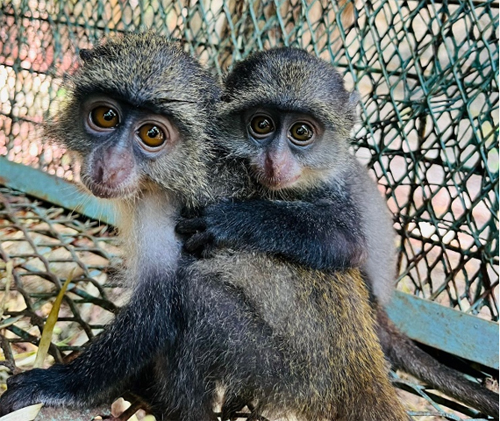
Mto and Mbuyu at Colobus Conservation. Photo Credit: Colobus Conservation In the month of November, different primates were rescued and treated at the Animal Welfare Clinic at Colobus Conservation. Colobus Conservation which works with ANAW to promote humane treatment of primates, is an organization that aims to promote, the conservation, preservation and protection of primates, in particular the Angolan colobus monkey and its associated coastal forest habitat. The work the organization does is key as many animals are harmed through accidents, human-wildlife conflict and electrocution among other causes. The clinic also attends to other species that are harmed in the community. In November, thirty (30) animal welfare cases were reported. Out of these five (5) were Baboons, ten (10) Colobus, ten (10) Sykes, four (4) Vervet and one (1) Bush baby. One (1} Vervet and one (1) Colobus were treated and released back into the wild. One (1) Sykes which was abandoned entered the long-term rehabilitation program for future release. The Climate Change Crisis Exacerbates Human Wildlife Conflict in Kasigau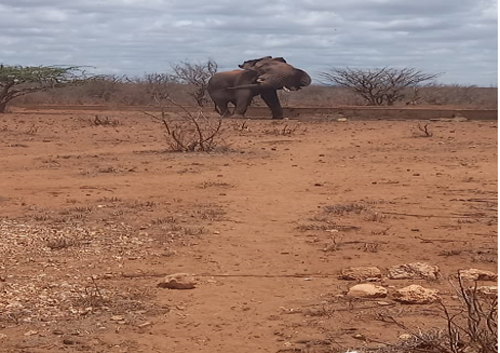
An Elephant Sighting during Patrol and the Dry Kasigau Ranch Adverse effects of drought caused by the prevalent climate change crisis has impacted greatly and negatively on communities living near Kasigau Ranch in Taita Taveta County. Numerous cases of human-wildlife conflict had been reported in October and November where wildlife ventured into community areas in desperate search of food and water. The ANAW-supported Kasigau Wildlife Guardians were notified of two (2) cases where eight (8) elephants destroyed a campsite near a borehole, destroyed two (2) water drums and food crops. A suspected poacher was arrested at Mghongonyi area with bush meat. Two (2) cases of human-wildlife conflict were reported in November where a man collided with an elephant at Mto Mwatate and his motorbike was completely damaged. A herd of elephant was cited to have destroyed 60 iron sheets, water tanks and food at Dapata mining area. The guardians covered 25 patrol areas in November. The number of animals spotted is low due to the ongoing drought experienced leaving all the dams and water pans dry with no water for the animals to drink. From the patrols, the team was also able to determine some of the areas that need frequent patrols after observing a lot of human movements and motorbike trucks in and out of the ranch. Msambweni Group Undertakes Clean-Up Activities to Protect Turtles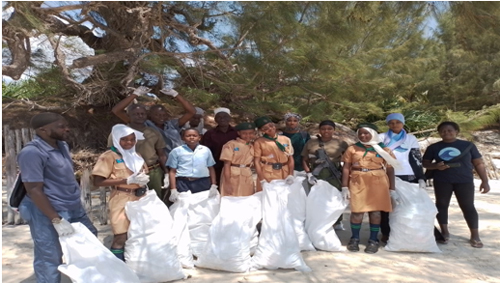
Community Members and Pupils Conducting a Beach Clean-Up Community volunteers that form the Msambweni Turtle Conservation Group, lead daily patrols in ensuring that the turtle is protected at the coast of the Indian Ocean in Msambweni, a small fishing town south of Mombasa. They conduct beach patrols to ensure the safety of turtles and any newly laid nests from poaching and predators. In November, there were no new nests laid. The group was however, able to conduct one beach clean-up on the November 4 in collaboration with community members, Kimkoev group, Mambo Sasa group, Madrasa Khairat, Nice View Children’s Home, Karama Academy, Msambweni primary and Etatu group. The groups were able to collect a total of 879 kilograms of trash which was sorted on November 8, 2022. There were no records of new nests laid at Funzi, but the group continues undertaking patrols to protect the existing nests as they wait for the hatching dates. Experiential Learning with University of Denver Students Takes Place Successfully in Kenya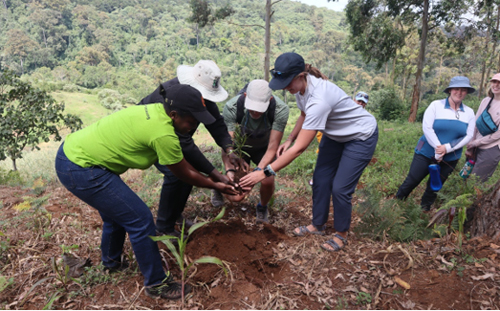
Denver Students, Faculty and ANAW Staff Planting Trees at Kereita Forest During the first three days of acclimatizing with the East African warm weather, American students explored the conservation and education areas, organizations and institutions in Nairobi before heading out camping across the country. Moments of profound learning, awe and friendly engagement were shared with their Kenyan counterparts in and experiential learning course. Africa Network for Animal Welfare (ANAW) hosted University of Denver students from the United States of America (USA) in Kenya for a two-week course from November 28 to December 12, 2022. The 13 students were pursuing a Master’s of Science in Social Work at the Graduate School of Social Work (GSSW). The field-based course was designed to introduce students to the social, political, economic, cultural and conservation issues of Kenya and East Africa. The course focused on service learning and direct experiences including conservation projects and field work focusing on ANAW’s hands-on conservation programs such as humane education, conservation education and capacity development to empower individuals and communities to support alternatives to the illegal bush-meat trade. A successful understanding of social work in Kenya took place at a one-day symposium at University of Nairobi facilitated by ANAW that was a supportive learning activity, interaction and discussion related to social work and animal welfare. With the support of ANAW team, students were able to learn policy and relevant laws with a focus on such topics as the conservation of nature and biodiversity, sustainability, land use, humane treatment and care of animals. 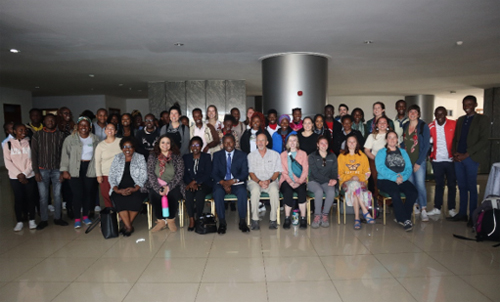
Group Photo: The Team from Denver University, University of Nairobi and ANAW During the Social Work Symposium Students experienced first-hand the social, cultural, historical, political, environmental, ecological and economic realities that currently exist in Kenya. The trip highlighted local issues and community-based efforts that facilitate socio-environmental justice to promote critical thinking and develop a knowledge-base for intervention strategies as well as environmental awareness, sense of belonging in a community, sustainability, resilience and advocacy. The interaction with different communities provided an opportunity to explore concepts of ecological economic sustainability with the Kasigau women basket weavers, table banking with a women’s group in the shores of Lake Naivasha, the Kijabe Environment volunteers, Kibera Girls Soccer Academy (KGSA) among other groups. The student had a chance to learn from Kenya Wildlife Service Community Warden in Naivasha, Esther Wangeci, who explained how the government was working with communities to ensure an ecological balance between wildlife and the people. The trip was conducted in three regions; Nairobi, Nakuru and Coast. Africa Conservation Education Fund (ACEF)ANAW advocates wildlife-adjacent communities by supporting education of students. This is achieved through the provision of education scholarships for needy students from wildlife - adjacent communities. If you would like to help us keep these children in school, please see http://www.anaw.org/ACEF Support Our Work Here's a great way to support Africa Network for Animal Welfare (ANAW) to protect present and future generations of animals. You can do so through the following ways: A Donation A Legacy in Your Will |
